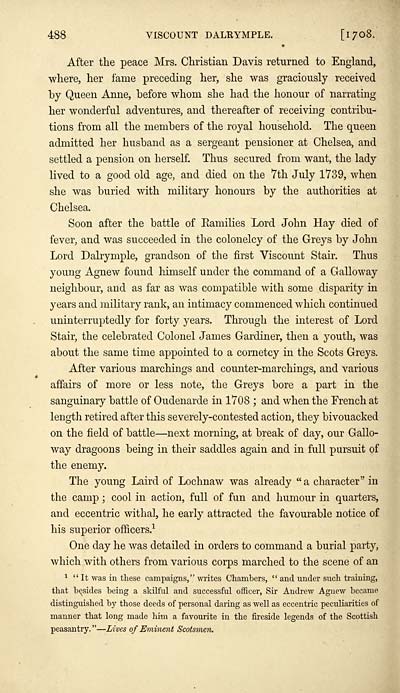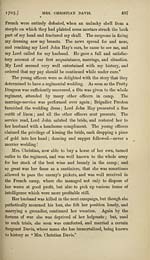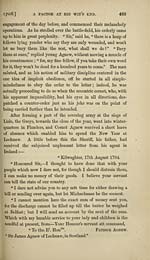Agnews of Lochnaw
(522) Page 488
Download files
Complete book:
Individual page:
Thumbnail gallery: Grid view | List view

488 VISCOUNT DALRYMPLE. [1708.
After the peace Mrs. Christian Davis returned to England,
where, her fame preceding her, she was graciously received
by Queen Anne, before whom she had the honour of narrating
her wonderful adventures, and thereafter of receiving contribu-
tions from all the members of the royal household. The queen
admitted her husband as a sergeant pensioner at Chelsea, and
settled a pension on herself. Thus secured from want, the lady
lived to a good old age, and died on the 7th July 1739, when
she was buried with military honours by the authorities at
Chelsea.
Soon after the battle of Eamilies Lord John Hay died of
fever, and was succeeded in the colonelcy of the Greys by John
Lord Dalrymple, grandson of the first Viscount Stair. Thus
young Agnew found himself under the command of a Galloway
neighbour, and as far as was compatible with some disparity in
years and military rank, an intimacy commenced which continued
uninterruptedly for forty years. Through the interest of Lord
Stair, the celebrated Colonel James Gardiner, then a youth, was
about the same time appointed to a cornetcy in the Scots Greys.
After various marchings and counter-marchings, and various
affairs of more or less note, the Greys bore a part in the
sanguinary battle of Oudenarde in 1708 ; and when the French at
length retired after this severely-contested action, they bivouacked
on the field of battle — next morning, at break of day, our Gallo-
way dragoons being in their saddles again and in full pursuit of
the enemy.
The young Laird of Lochnaw was already " a character" in
the camp ; cool in action, full of fun and humour in quarters,
and eccentric withal, he early attracted the favourable notice of
his superior officers. 1
One day he was detailed in orders to command a burial party,
which with others from various corps marched to the scene of an
1 "It was in these campaigns," writes Chambers, " and under such training,
that besides being a skilful and successful officer, Sir Andrew Agnew became
distinguished by those deeds of personal daring as well as eccentric peculiarities of
manner that long made him a favourite in the fireside legends of the Scottish
peasantry. " — Lives of Eminent Scotsmen.
After the peace Mrs. Christian Davis returned to England,
where, her fame preceding her, she was graciously received
by Queen Anne, before whom she had the honour of narrating
her wonderful adventures, and thereafter of receiving contribu-
tions from all the members of the royal household. The queen
admitted her husband as a sergeant pensioner at Chelsea, and
settled a pension on herself. Thus secured from want, the lady
lived to a good old age, and died on the 7th July 1739, when
she was buried with military honours by the authorities at
Chelsea.
Soon after the battle of Eamilies Lord John Hay died of
fever, and was succeeded in the colonelcy of the Greys by John
Lord Dalrymple, grandson of the first Viscount Stair. Thus
young Agnew found himself under the command of a Galloway
neighbour, and as far as was compatible with some disparity in
years and military rank, an intimacy commenced which continued
uninterruptedly for forty years. Through the interest of Lord
Stair, the celebrated Colonel James Gardiner, then a youth, was
about the same time appointed to a cornetcy in the Scots Greys.
After various marchings and counter-marchings, and various
affairs of more or less note, the Greys bore a part in the
sanguinary battle of Oudenarde in 1708 ; and when the French at
length retired after this severely-contested action, they bivouacked
on the field of battle — next morning, at break of day, our Gallo-
way dragoons being in their saddles again and in full pursuit of
the enemy.
The young Laird of Lochnaw was already " a character" in
the camp ; cool in action, full of fun and humour in quarters,
and eccentric withal, he early attracted the favourable notice of
his superior officers. 1
One day he was detailed in orders to command a burial party,
which with others from various corps marched to the scene of an
1 "It was in these campaigns," writes Chambers, " and under such training,
that besides being a skilful and successful officer, Sir Andrew Agnew became
distinguished by those deeds of personal daring as well as eccentric peculiarities of
manner that long made him a favourite in the fireside legends of the Scottish
peasantry. " — Lives of Eminent Scotsmen.
Set display mode to:
![]() Universal Viewer |
Universal Viewer | ![]() Mirador |
Large image | Transcription
Mirador |
Large image | Transcription
Images and transcriptions on this page, including medium image downloads, may be used under the Creative Commons Attribution 4.0 International Licence unless otherwise stated. ![]()
| Histories of Scottish families > Agnews of Lochnaw > (522) Page 488 |
|---|
| Permanent URL | https://digital.nls.uk/94904378 |
|---|
| Description | A selection of almost 400 printed items relating to the history of Scottish families, mostly dating from the 19th and early 20th centuries. Includes memoirs, genealogies and clan histories, with a few produced by emigrant families. The earliest family history goes back to AD 916. |
|---|

